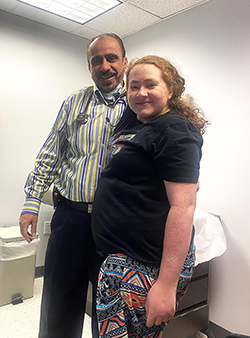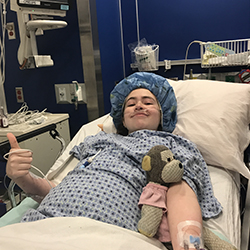Throughout her childhood, Natalia Rijos always sensed she was a bit different. She had an unusual way of walking, suffered from regular ankle injuries, and dealt with unrelenting tiredness that baffled her doctors. They dismissed her concerns as normal. But it wasn’t. Today, however, her health is on the right path, and she is immensely […]

Throughout her childhood, Natalia Rijos always sensed she was a bit different. She had an unusual way of walking, suffered from regular ankle injuries, and dealt with unrelenting tiredness that baffled her doctors. They dismissed her concerns as normal. But it wasn’t. Today, however, her health is on the right path, and she is immensely thankful for her medical team at UT Physicians.
“If it weren’t for Dr. Numan, I believe I would still be stuck in bed instead of enjoying the life I have now,” Natalia shared.

Misdiagnosed and disregarded
During her preteen years, Natalia’s condition deteriorated after her family relocated from Florida to Texas. She began to faint regularly, necessitating numerous visits to the emergency room.
“They couldn’t figure out what was wrong with me,” Natalia recounted.
It was only when she turned 13 that she received clarity. Her mother scheduled a visit with a neurologist who quickly suspected dysautonomia. He then referred her to Mohammed Numan, MD, a pediatric cardiologist affiliated with UT Physicians Pediatric Center Cardiology – Texas Medical Center.
Listening closely to heal
“When patients repeatedly hear ‘it’s all in your head’ from healthcare providers, it can be devastating,” Numan noted. “Natalia approached me, anxious that I might overlook her symptoms like the others.”
Rather than dismissing her intricate symptoms, Numan carried out comprehensive tests, including a tilt table examination and heart ultrasound. His diagnosis confirmed that Natalia had dysautonomia, a disorder impacting the autonomic nervous system responsible for regulating involuntary bodily functions such as heart rate, blood pressure, and thermoregulation. Numan likened dysautonomia to a malfunctioning autopilot system in the body.

“For most people, actions like standing, adjusting to heat, or digesting food occur without thought,” said Numan, who serves as a professor of pediatric cardiology at McGovern Medical School at UTHealth Houston. “Conversely, for someone with dysautonomia, these basic tasks may induce dizziness, fainting, nausea, and extreme fatigue.”
This condition frequently has a genetic basis and can be triggered by a variety of factors. Not all individuals exhibit the same symptoms or intensity, making diagnosis difficult. Natalia, for instance, faced issues across multiple systems, from gastrointestinal problems to persistent headaches. The most challenging phase was during puberty, when hormonal fluctuations compounded her nervous system challenges.
“Dr. Numan has guided us through treatment options and helped manage my symptoms so that I can lead as typical a life as possible,” Natalia stated. “He’s been our guide throughout this journey.”
One of the pivotal treatments involved identifying and repairing a small defect in Natalia’s heart, resulting in a 70% improvement in her headaches. Coupled with meticulous medication management, this intervention helped Natalia regain much of her lost functionality. Now at 24, Natalia shares that her symptoms have significantly lessened compared to her teenage years.

Chasing her archery passion
Despite the hurdles, Natalia has discovered a sport that brings her immense happiness. Archery is the one activity that makes her feel normal and in command of her body.
“While I’m shooting, everything else just disappears,” Natalia explained. “It’s a meditative experience for me. When I release the arrow, I am letting go of anger, resentment, and negativity.”
Natalia is fully committed to this new endeavor and is working toward securing a spot in the Paralympics. Although she narrowly missed qualifying for the 2024 team, her goal is now focused on the LA 2028 Paralympic Games.
“Archery has created countless exciting opportunities for me to travel and compete,” she expressed. “It has profoundly changed my life.”
Motivating others

Natalia shares her insights for others battling dysautonomia or other unexplained chronic conditions.
“Keep searching for the right medical professionals who will acknowledge and support you. They do exist, I promise,” Natalia advised. “Don’t allow your condition to define who you are — life has so much more to offer.”
After observing Natalia’s journey for ten years, Numan is inspired by her resilience. She has refused to give in to her condition. Even after returning to Florida, she maintained her relationship with UT Physicians to ensure continued improvement.
“Natalia has demonstrated that dysautonomia doesn’t have to be an incapacitating illness,” Numan affirmed. “She has accomplished so much in spite of her challenges. I hope her story encourages other patients to persevere.”














